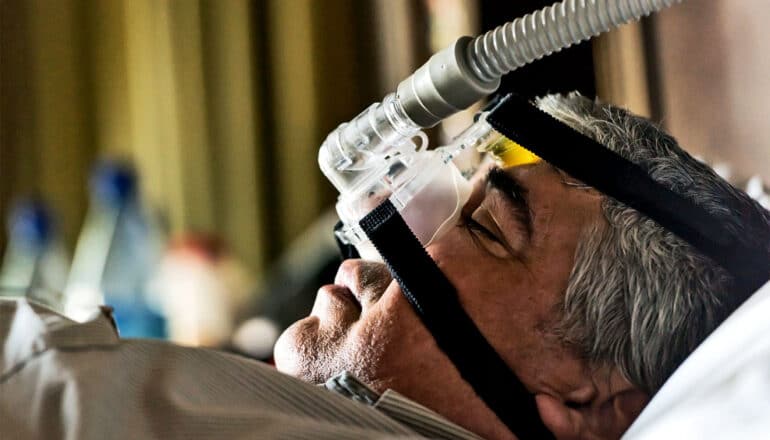
A new study offers insight into the underlying mechanisms within the brain that contribute to hypertension for people with sleep apnea.
“When oxygen levels in the blood drop during sleep apnea, the forebrain sends warning signals to the brainstem area that controls heart and lung functions,” says David Kline, a professor in the University of Missouri’s College of Veterinary Medicine and a researcher at the Dalton Cardiovascular Research Center.
The study findings can help pave the way for new drugs that target the brainstem to bring blood pressure back down to normal levels for those with sleep apnea.
Nearly 40 million adults in the US have sleep apnea, and more than 30 million of them use a continuous positive airway pressure (CPAP) machine while sleeping. However, the machines tend to be expensive, clunky, and uncomfortable—resulting in many users giving up on using them.
Hypertension leads to an increased risk of stroke, complications in the metabolism, and a variety of other health issues.
“Not only do those with sleep apnea often have high blood pressure, but they also lose a lot of sleep, they have more cognitive and memory issues, and they are more prone to injury at work due to sleepiness,” Kline says.
By being the first to identify the role that oxytocin and CRH play in strengthening and overexciting the pathways and mechanisms involved in sleep apnea, Kline and his fellow researchers hope to pave the way for the design of better therapeutic approaches for humans and animals.
“Our ultimate goal is to eventually help clinicians develop specific drugs to target either these neurochemicals or the proteins they bind to in a way that reduces high blood pressure,” Kline says. “This discovery opens the door for future research to block the pathways these neurochemicals use, ultimately helping to bring blood pressure back to normal levels.”
“I have always been fascinated by the brain and how it contributes to the cardiovascular and respiratory systems of our bodies,” Kline says. “I have a great group of interdisciplinary collaborators here at Mizzou who have helped me out tremendously, and seeing others in my lab make scientific discoveries brings me a lot of joy and excitement.”
The study appears in the Journal of Physiology.
Source: University of Missouri
The post How the brain responds to sleep apnea appeared first on Futurity.
from Futurity https://ift.tt/9LUjkeG
No comments:
Post a Comment